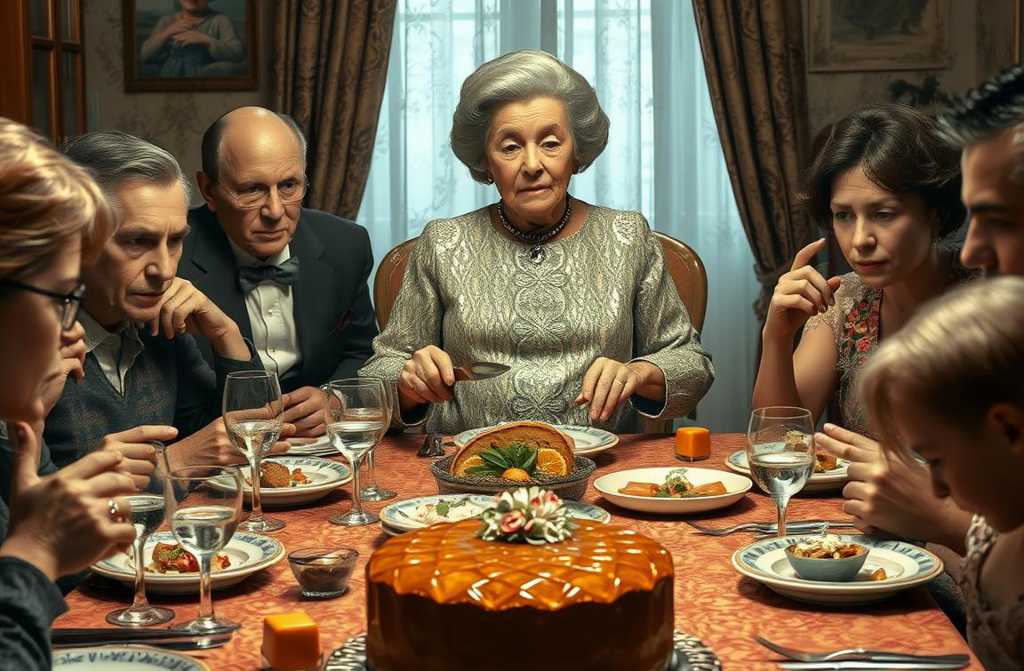**Why Should I Give You My Flat?**
It was Evelyn Whitmores milestone birthday. She had bustled about the kitchen since dawn, determined to make everything perfectno easy feat when cooking for a crowd. She had planned the menu weeks in advance, scoured farmers’ markets for organic vegetables, artisan cheeses, and the freshest cuts of meat. Supermarket fare simply wouldnt do. She wanted her family gathered around the table, her children and granddaughter spoiled with a feast. And, of course, she had baked the cake herselfher signature honey cake, the same one she had made for her daughter Lily and son Oliver on their birthdays.
Evelyns thoughts drifted to the past, when they had all lived together under this roofher husband, Professor Reginald Whitmore, the twins Lily and little Ollie, and she, a music teacher. Reginald, esteemed in his field and well-connected, had secured this grand four-bedroom flat, which Evelyn had furnished with exquisite taste. She had hunted down a crystal chandelier for the sitting room, a mahogany cabinet, and a fine Wedgwood dinner set, not to mention the perfect linen tablecloths and antique silverware. She took pride in her home, in hosting, in playing the piano for guests, in the genteel art of conversation. This was her fortress, her kingdom. And oh, how she had spoiled her husband and children with her cooking.
“Mummy, will my wife cook as well as you?” little Ollie had once asked.
“I hope so, darling. But such talent is rare,” shed replied with a smile.
“Then Ill just live with you forever!”
“Oh no, you wont. Children must grow up and leave the nest in time. A man ought to stand on his own two feet,” shed often said. She had no desire to be a live-in grandmother, crammed into a crowded household. She preferred Sunday visits, polite distance.
Then, suddenly, the happy life ended. Evelyn was left alone.
Reginald had passed abruptly one morninghis heart. The ambulance hadnt arrived in time. Hed taken his pills, seen his doctors, but death cares little for diligence.
Evelyn grieved, then carried on as best she could. The children flew the nest, just as shed always said they should. Lily finished her degree in economics, married a man named Simon, and moved into a grim rented flat in a rough part of townthe best they could afford. Their daughter, little Matilda, was born in the local hospital. Oliver, meanwhile, took up with a girl named Sophie, rented a dismal room in a shared house, and left too.
When Lily first married, she had asked, “Mum, could we stay with you for a bit? Just until Simon finds a proper job?”
“No, darling. Youre married nowstart your own life. Do you think your father and I had help? We scraped by in dreadful lodgings, no hot water, no gas. But we managed. And look at us nowrespectable, with our own home. You must do the same.”
She said the same to Oliver: “Youre a man. Provide for your family. If you take responsibility, you must see it through.” The children resented it but never argued. You couldnt force yourself on someone.
Evelyn believed in closeness at a distance. She called regularly, sent gifts, invited them for tea and cakes, took them to concerts where she accompanied her pupils on the pianoall to maintain the illusion of familial harmony.
And today, she had prepared a grand luncheon for her birthday. The table was set with her finest china, the air rich with spices. She had styled her hair, applied a touch of makeup, and donned her concert dress and diamond earringsa gift from Reginald.
At the appointed hour, the family arrived. Oliver and Sophie came first, bearing roses and a delicate bone china tea set.
“Oh, how lovely! You know just what I like,” Evelyn exclaimed, embracing them.
“Sophie, that dress is divine. And your cheeksso rosy! Like a doll.”
“We wanted to tell you” Oliver began.
“Later, later! Lily and Simon are on their way. Their wretched car broke down againtheyre taking three buses, but theyll make it.”
Half an hour later, Lily arrived with Simon and Matilda, bearing tulips and a velvet box containing a golden pendant with tiny sapphires.
“How they sparkle! Not diamonds, but pretty all the same. I shant wear them with these earrings, but theyll suit my ring nicely.”
“We couldnt afford diamonds, Mum,” Lily said wearily. “That old car eats our money, the rents gone up, Matildas lessons Its a scramble every month.”
“Lily, must we discuss dreary matters? Everyone has troubles. Theyll pass. Now, do come to the table.”
The family settled around the lavish spread, praising the food, making stilted small talk about work and weather.
“How wonderful this is, children. Only I do miss your father. He always brought me roses and jewels. And Id cook his favourites. Gone too soon.” She sighed. “But no matter. Lets eat, then Ill play, and well sing.”
Oliver raised his glass. “Mum, weve another gifta surprise. Honestly, it surprised us too.”
“Oh? Do tell,” Evelyn said, sipping her wine. Perhaps diamonds after allsomething to flaunt at the school.
“Sophie and I are expecting.”
A pause. Then”Goodness! What news! How wonderful!” She hugged them, though secretly irked that the spotlight had shifted.
Lily embraced her brother. Simon congratulated Sophie. Little Matilda beamed, caught up in the cheer.
“Now, now, enough fuss,” Evelyn chided gently. “Whod like seconds?”
Oliver slid a brochure across the table. “Mum, what do you think of this cottage?”
“Charming. Are you buying?”
“Its for you.”
“A gift?”
“No. You see weve lived in that awful shared house for years. The communal shower, the kitchen. Youve seen it.”
“Dreadful. But whats that to do with me?”
“Weve endured it. But with a baby comingwe cant raise a child there. So we were hoping youd sell this flat and help us buy our own.”
Lily and Simon gaped. Evelyn stiffened.
“Oliver, are you mad? This is my home. Your father and I built this life. And now you want me to hand it over and toddle off to some backwater cottage? The cheek!”
“Mum, you rattle around in four bedroomsa master, a guest room, a study, that enormous balcony. And were packed like sardines. Arent you ashamed?”
“*Ashamed*? After all Ive donegifts, concert tickets, hosting you? Ive a modest income, and you *count my rooms*?”
“I count them every time I queue for the shower! Parents should help their children!”
“Times are always hard! A child is *your* choiceprovide for it yourselves!” She turned to Lily. “And you? Silent?”
Lilys voice was icy. “So youd sell up and fund *their* flat? What about us? Weve rented for years. Matildas eight. We couldve had a mortgage if wed the depositbut you never offered!”
“You wanted to move in after your wedding. I said no. Children must stand on their own feet.”
“We *are* standing!” Oliver snapped. “But must we live in squalor? Is it a crime to want better?”
“Then work for it! Why must I surrender my home? Abandon everything, move God-knows-where?”
“Because *we* shouldnt have to suffer! Have you ever asked how it feels, living in a damp flat on the outskirts? When Matilda was ill last winter, did you think it might be the mould? Noyouve your concerts, your pupils, your precious china. You hoard this flat like a miser while we scrape by. Help your family!”
“I help as I can. But I wont beggar myself for your poor planning. Youre adultsact like it. Im keeping my home.”
Silence fell. Only the clock ticked, the floorboards creaked. Evelyn cut into her steak, savouring the silverware she so seldom used.
The children sat, chastened. Matilda fidgeted. “Grandmama, whats for pudding? Honey cake?”
“Honey cake, darling. Just like your mother loved.”
Lily stood abruptly. “Matilda, well have pudding at a café. Simon, were leaving. Thank you, Mum. It was lovely.”
“Your choice, darling. Oliver?”
“I think well go too.”
“Work never waits, does it? Thats how one gets ahead.”
As they muttered in the hall*”Why bring it up? The flatll be ours eventually.” “When? In a century? Shed rather rot here than help







